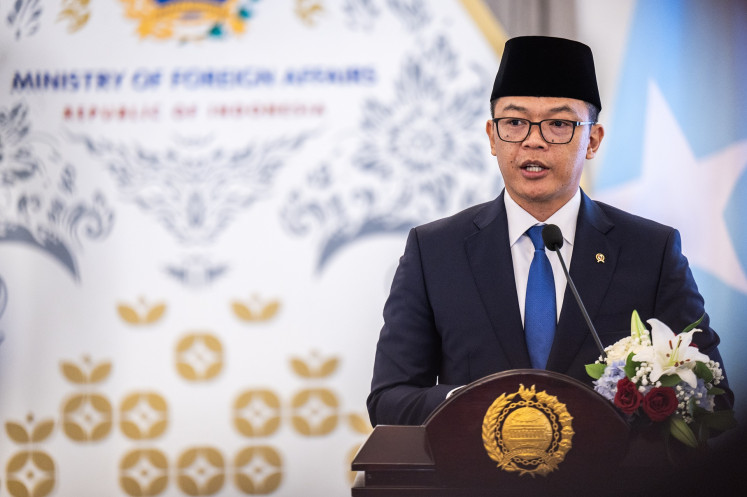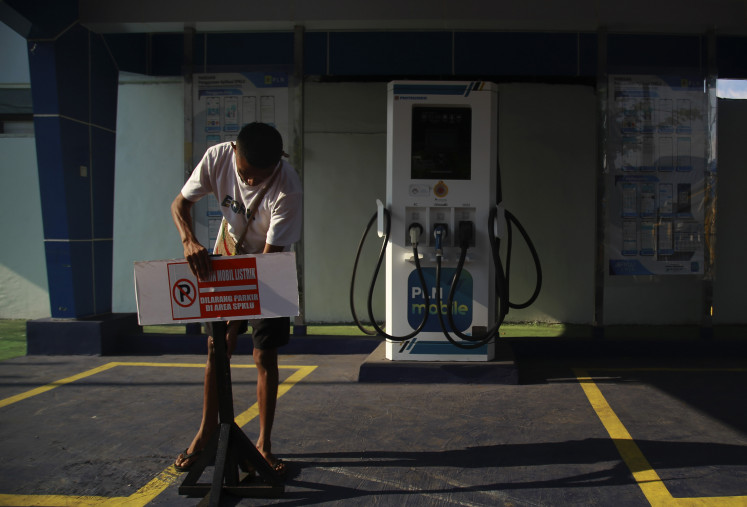Popular Reads
Top Results
Can't find what you're looking for?
View all search resultsPopular Reads
Top Results
Can't find what you're looking for?
View all search resultsAnies Baswedan: Homegrown scientists
Anies Baswedan — a former Fulbright scholar who went on to be the youngest rector in Indonesia — recently recounted the distances his parents enabled him to travel thanks to his bicycle during his childhood days
Change text size
Gift Premium Articles
to Anyone
A
nies Baswedan — a former Fulbright scholar who went on to be the youngest rector in Indonesia — recently recounted the distances his parents enabled him to travel thanks to his bicycle during his childhood days.
JP/Arief Suhardiman
I was the first child in my village who was permitted by his parents to hop on a bicycle and cycle to downtown Yogyakarta to visit the library,” Anies reminisced on growing up in Yogyakarta.
He added that the excitement of cycling downtown was what actually motivated the young Anies to go the distance just to get his nose into books, including those on science.
“I went to the library because it was an honor to ride a bike to the library to borrow books,” he continued.
Looking back, Anies now sees the whole bicycle adventure as a smart strategy his parents — both educators — had adopted to stimulate his enthusiasm for not only science, but also for “reading and appreciating knowledge” no verbal orders like “read this book because it is important” would have ever achieved.
“I think we are at the level where families could apply ingenious techniques in stimulating children to read and be interested in the sciences,” he told The Jakarta Post.
One tried and tested technique to familiarize children with the
sciences was for parents to subscribe to science magazines geared to children, the way his parents had done.
“Provide learning facilities at home. For those who can afford subscriptions, subscribe to science magazines. For those who have cable television, reduce the hours of watching cartoons and increase the time watching shows on science,” he said.
As for working parents with limited time, Anies suggested tapping into the rich resources available online and “to think of strategies to optimize limited time”.
“They can allocate 15-20 minutes of their time at work to browse for material they can bring home as conversation pieces on science,” he said.
He added that such levels of parental involvement were indispensable in raising science savvy children. However, he pointed out that first and foremost, parents must regard science highly.
“Parents must be made aware of the importance of science education because without them, the children could not be made aware as well,” he said, adding that parents must wake up and realize that understanding science was essential for their children in surviving in the modern world.
“Our children live in a new era and the new era calls for a high comprehension and attention to the sciences as this will impact their approach to life,” he pointed out.
Many parents were still unaware of engendering a love for the sciences in their children because Indonesian society itself is largely aloof about science.
“The intellectual tradition related to science is relatively new for us in Indonesia. Secondly, the portion in science studies in our education sector is still slight,” he commented, adding that the government and opinion makers within society have not done much to push science awareness in society as well.
Indonesia scored 427 on the Trends in International Mathematics and Science Studies (TIMSS), ranking 35th out of 48 countries and lagging behind Singapore, Malaysia and Thailand.
This was, of course, a deficiency because science aids both young and old in “dealing with problems by looking into processes as well as thinking systematically and analytically”.
A 2010 joint report titled “Inside Indonesia’s Mathematics Classrooms: A TIMSS video study of teaching practices and student achievement” by the National Education Ministry and the World Bank states that “despite Indonesia’s great success in achieving near universal enrollment at the primary and junior secondary level, many students still have low literacy and cognitive skills” given Indonesia’s low international test rankings.
More than just memorizing units of measurement, science helps children grasp what counts in life.
“One of the most important lessons attained from studying science is to learn from experience and to never fear exploring something new,” he said.
The trials and errors involved in science studies and experiments “makes you courageous and unafraid to make mistakes”, he added.
“Secondly, it trains people to plan ahead because everything in science must be planned well. You have to write down your plans and once you have written them down, you have to execute them,” he said.
A good mind for sciences could also strengthen faith in the heart.
“The way I see it, science plays a big role in reinforcing our faith. Science helps us explain the systematic way of our faith and this can solidify the faith we have,” he told the Post.
Most importantly, he said, the open-mindedness science supports prevents people from being trapped in religious dogma that narrows their views.
The pursuit of science, for Anies, is also a character builder for children.
“Scientific experiments require honesty. The objective of your process is to find the truth and that can only be done if you adopt a high level of integrity. You must report and not modify whatever results you found in your lab,” he noted.
And if the results were far from satisfactory, the child needs to improve his or her work the next time around.
“Science is one of the best ways to give children examples of integrity and honesty,” he added.
However, parents must note that interest in science is what counts, not grades. Anies remarked that he was not a science whiz in the classroom.
According to him, he did “okay” by scoring around eight out of 10 on his exams.
“I was not the best performing student but I think I have learnt a lot and the message to parents and teachers is let’s not judge students by their grades or class performance, but by the interest they show in science and knowledge in life,” he said.










